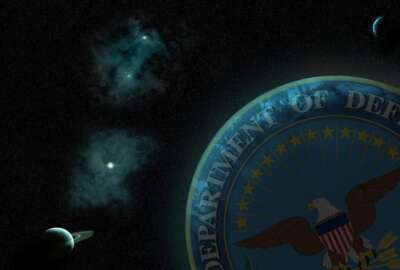
New House caucus helping Space Force launch into action
Caucus member and Texas Republican Brian Babin joined Federal Drive with Tom Temin to talk about some of the issues the caucus plans to work on.
Best listening experience is on Chrome, Firefox or Safari. Subscribe to Federal Drive’s daily audio interviews on Apple Podcasts or PodcastOne.
A new bipartisan caucus in the House has dedicated itself to supporting the sixth and newest armed service: The U.S. Space Force. Caucus member and Texas Republican Brian Babin joined Federal Drive with Tom Temin to talk about some of the issues the caucus plans to work on.
Interview transcript:
Tom Temin: Rep. Babin, good to have you on.
Brian Babin: Great to be with you, Tom.
Tom Temin: And you’ve got both Democrats and Republicans so there’s bipartisan support in seeing that this whole Space Force gets launched out of its infancy in the right way.
Brian Babin: Absolutely. We have I think we’re currently at about 20 members made up of both sides of the aisle – pretty evenly too, Republicans and Democrats.
Tom Temin: And just review for us what powers a caucus has and does not have relative to say a committee.
Brian Babin: Sure, simply put the Space Force caucus is a group of members of the House of Representatives. And we all share in the recognition that space is becoming increasingly contested, congested and competitive, if I could say it like that, and who also understand the importance of recognizing that space is now a warfighting domain. It’s lamentable, that it has become a warfighting domain but our adversaries have pushed militarism into that domain. And we have to keep up with that. In recent years, the behavior of our near peer adversaries like China and Russia, have caused the Trump administration and Congress to create the six and newest branch of the military, the United States Space Force, and that our goal with this caucus is to advocate for this new branch and educate the rest of our colleagues on its significance and its importance, especially if America is going to continue to lead in space in the future. And that’s it.
Tom Temin: And do you have also cross membership or good relations, at least with the Armed Services Committee?
Brian Babin: Absolutely we do. We work with a lot of armed services members. In fact, I would say that most of the members of this caucus are from House Armed Services. And as I said earlier, we have our 20 members, about 20 members made up of both Republicans and Democrats. And these include not only myself but Democrat Rep. Kendra Horn from Oklahoma, Jason Crow from Colorado, Charlie Crist from Florida, among many others. And since being elected to Congress, I’ve served on the House Space and Aeronautics subcommittee, as the chairman and currently the ranking member there at that subcommittee. And while Democrats and Republicans certainly have our differences, I’ve noticed that space seems to be one of those rare policy areas in Congress where – thank the Lord – we have ample opportunities to push our country forward together. Quite frankly, worked pretty bipartisanly here. And we’re interacting with the Armed Services Committee, I think that’s what your question was, and the overwhelming majority, I think I might have said this of the Space Force caucus membership serves on that committee – House Armed Services. I don’t – as I mentioned, I’m on the Science, Space and Technology committee, and I also serve on the Transportation and Infrastructure committee. And one of the benefits to a caucus, Tom, is that it is not an official affiliate of the committees, giving us a little more latitude to pursue the specific targeted priorities that we’re all interested in. And that being said, I look forward to working with HASC or any other committee for that matter, and other caucuses as well as these opportunities may arise.
Tom Temin: And of course, with members from Texas, Florida, Colorado, as you mentioned, a lot of you are in the space neighborhood already, so to speak.
Brian Babin: No question about it. I’m sitting here in Houston today, I just got through meeting with Gen. Jay Raymond, who is the new chief four-star general, who is in charge of the Space Force. I had breakfast with him this morning. And of course, I also represent Johnson Space Center, and very, very familiar in my capacity as the former chairman of the House Subcommittee on Space and Aeronautics and now the ranking member, to meet a lot of our space people from commercial side and industry. And I think [we’re] certainly looking forward to working together with our folks on the military side in House Armed Services, to make things happen and get the word out on how valuable and how necessary the Space Force is.
Tom Temin: We’re speaking with Texas Congressman Brian Babin, a member of the House Space Force Caucus. And what are the priorities that you see for the Space Force, it’s been around, I guess, maybe a year or so now. And what are you hoping for it at this point?
Brian Babin: Well in setting up the Space Force, Gen. Raymond and his leadership team are doing something that have not been done since 1947. When they created the United States Air Force from the United States Army Air Corps. And Gen. Raymond has an incredibly unique opportunity to try something that their sister services are simply not positioned to do, or they’re too bloated by years of bureaucratic growth to do. And it’s my goal that this new branch does not lose that agility. And Gen. Raymond this very morning at breakfast told us that he was trying to on purpose – purposely wanting to keep the Space Force small, agile and quick. He said that the Space Force has to move in a rapid manner. And having too much bureaucracy is something that would be contrary to what he has in mind for the Space Force. And we’re hoping that this branch does not lose that agility that he’s asking for, and looking for. And over the last couple of decades, we’ve seen a very rapidly increasing confluence between commercial, civil and defense space efforts, especially when it comes to technology application. And one topic that I’m very interested in is exploring how our newest military branch, the Space Force, can build upon this confluence to enable a more agile and hopefully cheaper acquisition process that is not getting bogged down and running over, you know, some of the – some of the sums that we would not ordinarily do if they were more agile.
Tom Temin: Yeah, you’re kind of beat me to the next question. And that is on the non-military space side, NASA, of course, they are fully now into a new age of using commercial outfits for launch, and many other things, even research and so on. Do you envision that perhaps for the Space Force, where instead of acquiring a lot of infrastructure, you could use the commercial capabilities that seemed to grow almost day by day?
Brian Babin: I think that is exactly a goal. Gen. Raymond did not mention that today. But I can tell you that I think having commercial space companies and that and then the industry on the commercial side, is something that could save so much taxpayer money, and we’ve used it and other branches of the service made excellent use there. So I think that this is definitely going to be one of the goals of Gen. Raymond, and our Space Force caucus.
Tom Temin: Got it. And I guess, it’s probably important to keep an eye on the rest of the military, the joint chiefs and so forth, because sometimes a new force like that can get a little bit lost in the shuffle.
Brian Babin: That’s exactly right. If you know anything about the about the history of our Army Air Corps, there were several generals in history that actually had their careers ruined and lost their careers, because they advocated so much and they had the vision to see just exactly what aircraft could bring to the warfighting domain. And you know, it’s happened so frequently, much of the leadership back in those days, just couldn’t see that. And simply thought it was just a quirk that an airplane that could fly maybe 30 miles an hour and maybe only a half a mile, and at some point and back in its development, and they just couldn’t see that. And we want to make sure that this doesn’t happen here. I think Gen. Raymond has a great idea. He’s working very, very diligently with the rest of his counterparts. And I’m looking forward to some really good developments that are going to keep Americans safe, and keep our communications. You know, space is so important to everything we do today, and guarding our satellites, our constellations, and making sure that we don’t have surprise attacks. Our adversaries have technology that is capable of taking down our satellites, and we want to be able to react quickly and firmly. And this is something that we want to make sure that it does happen.
Tom Temin: Texas Congressman Brian Babin is a member of the House Space Force Caucus. Thanks so much for joining me.
Brian Babin: Absolutely. Thank you, Tom. Looking forward to the future. I think it’s very bright.
Tom Temin: We’ll post this interview at FederalNewsNetwork.com/FederalDrive. Subscribe to the Federal Drive at Apple podcasts or wherever you get your podcasts.
Copyright © 2024 Federal News Network. All rights reserved. This website is not intended for users located within the European Economic Area.
Tom Temin is host of the Federal Drive and has been providing insight on federal technology and management issues for more than 30 years.
Follow @tteminWFED





